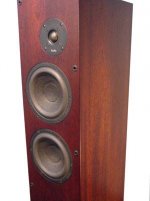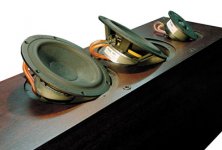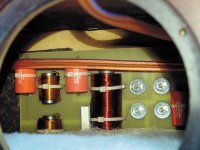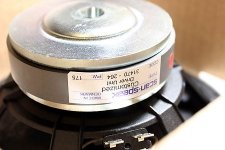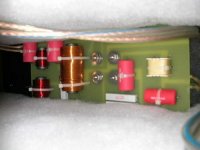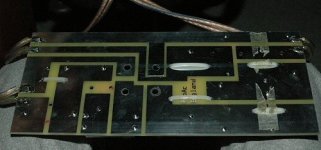The tweeter looks to be the SS9700, and middledriver is most likely the 8545 driver, whilst the bass driver with its smaller magnet has to be the 8535.
The crossover is impossible to say anything about jedged from the picture - you cannot deduct the rest from a fractional picture.
Another (sad) thing is that several people lean to the assumption that proac use customized drives, given the fact that the 2.5 clone with the EXACT filterclone does not sound as good as the original - I have heard it in several occations.....
Cheers !
Buhl
The crossover is impossible to say anything about jedged from the picture - you cannot deduct the rest from a fractional picture.
Another (sad) thing is that several people lean to the assumption that proac use customized drives, given the fact that the 2.5 clone with the EXACT filterclone does not sound as good as the original - I have heard it in several occations.....
Cheers !
Buhl
Andrew we need bigger pictures...
Those midwoofers both look like 8535-type to me.
At least based on magnet size. The 854x drivers have an magnet that's massive- 120mm in diameter and larger than the base of the woofer's frame-
Compare side profile dimensions of the 8545...
http://www.tymphany.com/datasheet/printview.php?id=90
to the 8535...
http://www.tymphany.com/datasheet/printview.php?id=87
From my calculations of the 3.8 cabinet, it's around 66L internal volume, which is fit for 2x 8535-like drivers.
The Stereophile reviews says a 25mm SEAS tweeter, but the pic-
http://www.proac-loudspeakers.com/datasheets/NewPDFS_March06/ProAc_Response_3pt8_Leaflet.pdf
From Andrew's pics that looks like an SS 9x00.
In the official ProAc flyer, the pic looks like an SS too, and in the description of the tweeter it says "Special frontplate with copper ring assembly which implies the 9700 (copper faraday ring)instead of the 9500/9300 to me.
As for the crossover, which is critical, I don't think we'll ever get to the bottom of this unless someone wants to crack open their original 3.8 and take some measurements...
Those midwoofers both look like 8535-type to me.
At least based on magnet size. The 854x drivers have an magnet that's massive- 120mm in diameter and larger than the base of the woofer's frame-
Compare side profile dimensions of the 8545...
http://www.tymphany.com/datasheet/printview.php?id=90
to the 8535...
http://www.tymphany.com/datasheet/printview.php?id=87
From my calculations of the 3.8 cabinet, it's around 66L internal volume, which is fit for 2x 8535-like drivers.
The Stereophile reviews says a 25mm SEAS tweeter, but the pic-
http://www.proac-loudspeakers.com/datasheets/NewPDFS_March06/ProAc_Response_3pt8_Leaflet.pdf
From Andrew's pics that looks like an SS 9x00.
In the official ProAc flyer, the pic looks like an SS too, and in the description of the tweeter it says "Special frontplate with copper ring assembly which implies the 9700 (copper faraday ring)instead of the 9500/9300 to me.
As for the crossover, which is critical, I don't think we'll ever get to the bottom of this unless someone wants to crack open their original 3.8 and take some measurements...
Can anyone translate Polish ?
************************
Impedancja znamionowa wynosi 8 omów, a minimum modu³u 6,5 oma i le¿y w wšskim zakresie w okolicach 3 kHz.
Rys. 1. ProAc Response 3.8. Charakterystyka impedancji elektrycznej - amplituda i faza. Czêstotliwoæ podzia³u miêdzy g³onikami 18-centymetrowymi a wysokotonowym wynosi ok. 2580 Hz. Nachylenie charakterystyki w pamie zaporowym dla g³onika wysokotonowego to 18 dB/okt., natomiast dla czêci nisko-redniotonowej ok. 24 dB/okt. Charakterystyka dolnego g³onika opada ju¿ od 150 Hz, natomiast górny g³onik przetwarza pasmo do ok. 2,5 kHz, gdzie ³šczy siê z wysokotonowym.
Rys. 2. ProAc Response 3.8. Charakterystyki g³onika wysokotonowego i sumy obydwu g³oników nisko-redniotonowych, a tak¿e otworów bass-reflex, zmierzone metodš bezechowš MLS. Poni¿ej 350 Hz charakterystyki zmierzono w polu bliskim. Wypadkowa charakterystyka zmierzona na osi g³onika wysokotonowego (rys. 3) wyranie ukazuje mocne podbicie basu w zakresie 50 - 100 Hz, co komplikuje sprawê ustawienia kolumn w pomieszczeniu ods³uchowym. Podbicie wysokich tonów wystêpuje dla czêstotliwoci powy¿ej 7 kHz. Poza tym charakterystyka jest g³adka, bez wiêkszych nierównomiernoci. Œrodek pasma mieci siê w granicach +/-1,5 dB.
Rys. 3. Charakterystyka wypadkowa ProAc Response 3.8 w odleg³oci 1 m, zmierzona metodš bezechowš MLS. Poni¿ej 350 Hz charakterystyki zmierzono w polu bliskim. Charakterystyki zmierzone w p³aszczynie poziomej pokazujš, ¿e najwiêksza "dziura" dla 2,5 kHz wystêpuje dla kierunków, dla których g³onik wysokotonowy jest bli¿ej ni¿ pozosta³e. Ustawiajšc wiêc kolumny równolegle i g³onikami wysokotonowymi do wewnštrz, w miejscu ods³uchu otrzymujemy dziurê w zakresie rednich czêstotliwoci. W kierunku przeciwnym charakterystyka prostuje siê i maleje podbicie wysokich tonów.
Rys. 4. Charakterystyka kierunkowa w poziomie, wypadkowa Response ProAc 3.8 w odleg³oci 1 m, zmierzona metodš bezechowš MLS. Poni¿ej 350 Hz charakterystyki zmierzono w polu bliskim.
************************
Impedancja znamionowa wynosi 8 omów, a minimum modu³u 6,5 oma i le¿y w wšskim zakresie w okolicach 3 kHz.
Rys. 1. ProAc Response 3.8. Charakterystyka impedancji elektrycznej - amplituda i faza. Czêstotliwoæ podzia³u miêdzy g³onikami 18-centymetrowymi a wysokotonowym wynosi ok. 2580 Hz. Nachylenie charakterystyki w pamie zaporowym dla g³onika wysokotonowego to 18 dB/okt., natomiast dla czêci nisko-redniotonowej ok. 24 dB/okt. Charakterystyka dolnego g³onika opada ju¿ od 150 Hz, natomiast górny g³onik przetwarza pasmo do ok. 2,5 kHz, gdzie ³šczy siê z wysokotonowym.
Rys. 2. ProAc Response 3.8. Charakterystyki g³onika wysokotonowego i sumy obydwu g³oników nisko-redniotonowych, a tak¿e otworów bass-reflex, zmierzone metodš bezechowš MLS. Poni¿ej 350 Hz charakterystyki zmierzono w polu bliskim. Wypadkowa charakterystyka zmierzona na osi g³onika wysokotonowego (rys. 3) wyranie ukazuje mocne podbicie basu w zakresie 50 - 100 Hz, co komplikuje sprawê ustawienia kolumn w pomieszczeniu ods³uchowym. Podbicie wysokich tonów wystêpuje dla czêstotliwoci powy¿ej 7 kHz. Poza tym charakterystyka jest g³adka, bez wiêkszych nierównomiernoci. Œrodek pasma mieci siê w granicach +/-1,5 dB.
Rys. 3. Charakterystyka wypadkowa ProAc Response 3.8 w odleg³oci 1 m, zmierzona metodš bezechowš MLS. Poni¿ej 350 Hz charakterystyki zmierzono w polu bliskim. Charakterystyki zmierzone w p³aszczynie poziomej pokazujš, ¿e najwiêksza "dziura" dla 2,5 kHz wystêpuje dla kierunków, dla których g³onik wysokotonowy jest bli¿ej ni¿ pozosta³e. Ustawiajšc wiêc kolumny równolegle i g³onikami wysokotonowymi do wewnštrz, w miejscu ods³uchu otrzymujemy dziurê w zakresie rednich czêstotliwoci. W kierunku przeciwnym charakterystyka prostuje siê i maleje podbicie wysokich tonów.
Rys. 4. Charakterystyka kierunkowa w poziomie, wypadkowa Response ProAc 3.8 w odleg³oci 1 m, zmierzona metodš bezechowš MLS. Poni¿ej 350 Hz charakterystyki zmierzono w polu bliskim.
I have a few notes that I took whilst searching the web a while ago, looking for more info on the 3.8 and came across a photo of the 3.8 XO, and some interesting quotes. Sadly, I no longer have the photo, but here are the notes I made:
http://f18.parsimony.net/cgi-bin/topic-flat.cgi?Nummer=32311&Phase=Phase1&ThreadNummer=388
This quotes the internal dimensions of the 3.8 as 18,4 cm wide, 29 cm deep and 115 high.
http://www.diyaudio.com/forums/showthread.php?s=&threadid=5603&highlight=
The last post quotes the external dimensions as 1215mm H x 340mm D x 233 mm W.
Comparing the above two suggests a cabinet wall thickness of 25mm all the way around.
It also quotes the port measurements: 2 ports at 70mm I.D x 135mm long.
Going back to the first link above, it also comments on the 3.8's XO, suggesting that the 2.5's XO could be used for the tweeter & bass/mid, and a 12mH inductor for the bass.
I compared the 2.5's XO (i.e. the original one) to the pic I had of the 3.8's, and noted that the layout, number and type of components used in the 3.8 were the same as the 2.5, with the following exceptions:
1. Obviously component values are not necessarily the same.
2. The 47R resistor in the 2.5's tweeter filter is omitted in the 3.8.
3. The 5R resistor in the 2.5's tweeter filter is replaced by 2 parallel resistors (values unknown).
4. The bass filter consists of a single large inductor in series with the -ve (maybe the 12mH suggested above would suit?).
Lastly, I also had the following quote from a DIYA post, where a fair bit of info was given on a number of different Proacs, but sadly I didn't note the link (a search should unearth it):
"The 3.8 crossover is 2nd order on the bass unit, at 300 hz, and the rest I think is identical to the 2.5 ie 3rd order midbass, 3rd order tweeter."
This kinda backs up the 2nd quote above... maybe someone could do some calcs based on the xo points to see if the component values suggested above (i.e. 2.5's values + 12mH for bass) stack up.
Hope this helps.
http://f18.parsimony.net/cgi-bin/topic-flat.cgi?Nummer=32311&Phase=Phase1&ThreadNummer=388
This quotes the internal dimensions of the 3.8 as 18,4 cm wide, 29 cm deep and 115 high.
http://www.diyaudio.com/forums/showthread.php?s=&threadid=5603&highlight=
The last post quotes the external dimensions as 1215mm H x 340mm D x 233 mm W.
Comparing the above two suggests a cabinet wall thickness of 25mm all the way around.
It also quotes the port measurements: 2 ports at 70mm I.D x 135mm long.
Going back to the first link above, it also comments on the 3.8's XO, suggesting that the 2.5's XO could be used for the tweeter & bass/mid, and a 12mH inductor for the bass.
I compared the 2.5's XO (i.e. the original one) to the pic I had of the 3.8's, and noted that the layout, number and type of components used in the 3.8 were the same as the 2.5, with the following exceptions:
1. Obviously component values are not necessarily the same.
2. The 47R resistor in the 2.5's tweeter filter is omitted in the 3.8.
3. The 5R resistor in the 2.5's tweeter filter is replaced by 2 parallel resistors (values unknown).
4. The bass filter consists of a single large inductor in series with the -ve (maybe the 12mH suggested above would suit?).
Lastly, I also had the following quote from a DIYA post, where a fair bit of info was given on a number of different Proacs, but sadly I didn't note the link (a search should unearth it):
"The 3.8 crossover is 2nd order on the bass unit, at 300 hz, and the rest I think is identical to the 2.5 ie 3rd order midbass, 3rd order tweeter."
This kinda backs up the 2nd quote above... maybe someone could do some calcs based on the xo points to see if the component values suggested above (i.e. 2.5's values + 12mH for bass) stack up.
Hope this helps.
andrew01 said:drivers...
hi andrew,
where do you found those intresting photos on r3.8 ?
thank you
b.r.
iestynrw said:I have a few notes that I took....................Hope this helps.
thank you for your support,
but the links and the infos are not really for clone the r3.8,but only to build a system with scan drivers.
to make the situation clear :
- the wf of the 3.8 are the same of 2.5
- the tw of the 3.8 is different by the 2.5 one. it seems to be d9500 or 9700 (i think it is) : i think it is not the 9500 besause of the cost and the class of the 3.8.
- the filter is completly different by the 2.5 : this is the most important point.
nobody has the schematics.
-- --> however too difficult to reach (copy) the response of spereophlie (for example) with different measuremet setup and room.
this to copy the tranfer function of the measurement.
but like i sad too many differen conditions.
....and in the case we have the possibility to measure in the same condition and with the same equipements,i'm not sure that in this empirical way we could "copy" exactly the component value of the original.
--> it needs the schematis.
- for the cabinet a think that respecting all measures is good idea.
to finish : does somebody have a review of the 3.8 ?
i think this is the best way.
b.r.
andrew01 said:OK,
I've done this drawing of the crossover , taken from photos of a REAL proac crossover , unfortuneatley don't have the values , but its a start............
from photos,yes,but to track the exact circuit layout you must see it from the opposite face : you must have the crossover in your hands.
there is no change to keep the value of the components ?
do you have the speakers to see the values,now?
do you remember on the tw and wf what was written?
b.r.
andrew01 said:here's photo of driver rear
well,it is a customized version of the 8535 really customized?,i don't this:expecially in the parts we can not measure?.
the best thing is to measure them and compare with the 8535 diy version.
b.r.
The drawing is exact circuit of crossover . I had photos of both sides of PCB and I make a negative of the track layout and draw it.
andrew01 said:The drawing is exact circuit of crossover . I had photos of both sides of PCB and I make a negative of the track layout and draw it.
well.
now the problem is to know the components value........ if only you have photos...........
have you loose them?
b.r.
p.s.
please ,do you have a photo of the rear of the tw?
andrew01 said:Here's photos I was sent. The component values cannot be read.
thank you for all photos.
i don't waste your time : but if all the photos you have are too big to be posted here please send my an e-mail.
now mant photos do you have?
b.r.
Wonderful!!
This will be my first diy work! I was thinking at the 2.5 project, but 3.8 is surely better for my 50 square meters room..
Thanks to anyone could help to fill the crossover blanks!!
This will be my first diy work! I was thinking at the 2.5 project, but 3.8 is surely better for my 50 square meters room..
Thanks to anyone could help to fill the crossover blanks!!
ferro20 said:Wonderful!!
This will be my first diy work! I was thinking at the 2.5 project, but 3.8 is surely better for my 50 square meters room..
Thanks to anyone could help to fill the crossover blanks!!
hi ferro20,
thanks to andrew,that has posted usefull photos of orginal 3.8.
now the only problem is components value,and the model of tw but i think that is the 9700.
b.r.
- Home
- Loudspeakers
- Multi-Way
- Proac response 3.8 crossover
